#Online esports tournaments
Explore tagged Tumblr posts
Text
JOIN THE STRING ESPORTS TOURNAMENT AND TURN YOUR PASSION INTO REWARDING VICTORIES
String Esports, a division of String Metaverse, is revolutionizing competitive gaming at a global level as it continues to evolve in the world of esports. By means of its ground-breaking platform, one can find that String Esports offers several features such as competitive online tournaments, regional leagues and LAN events among others. It is a dynamic platform that caters for all types and levels of gamers making it every gamer’s ultimate destination anywhere in the world.
The leading organizers of tournaments also include String Esports, I believe. It offers different kinds of idea options in the gaming section, and there are month-to-month and week-to-week tournaments. An international Esports platform providing competitive online Tournaments, Regional Leagues, LAN Events, and Cash Wagers. String esports will be hosting tournaments on Call of Duty, Valorant, and BGMI and will add more games in the future.

Register now for String Esports Valorant Tournament Website and Discord Link in Bio 💸Prize Pool: Rs.30,000 / $350 🆓FREE ENTRY 🎮Platform: PS5 & Xbox SX 📖Format: 5v5 Competitive - Best of 3 📍Region: Asia ⏰Tournament Start Date: 7th Sept 6pm IST Register here: http://esports.stringmetaverse.com/
#Esports tournaments#pc games#Battleground Tournaments#Esports Weekly Tournaments#Online esports tournaments
1 note
·
View note
Text
MSC 2023: The Biggest Mobile Legends Tournament in Southeast Asia
The Mobile Legends: Bang Bang Southeast Asia Cup (MSC) is the biggest Mobile Legends tournament in Southeast Asia. It is held annually and features the best teams from the region. The 2023 edition of the MSC will be held in Cambodia from June 10 to 18, 2023. This year’s tournament will be more competitive than ever before, with teams from North America, Turkey, and the Middle East and North…

View On WordPress
0 notes
Text
VCT LOCK IN Brazil 2023 Tickets
As the esports world gears up for the VCT LOCK IN Brazil 2023, Riot Games announced the ticketing details for the marquee tournament. The VALORANT Champions Tour kicks off on December 13, 2022 and will bring all the partnered teams from North and South America, Pacific, and EMEA VCT Leagues to São Paulo, Brazil for the biggest Valorant LAN event to date.
VCT LOCK IN Brazil 2023 Tickets

Ticket prices (in Brazilian Real [R$])
Weekdays: R$ 90/ Student Discount: R$ 45 ($16.79 USD)
Weekends: R$ 110/ Student Discount: R$ 55 ($20.53 USD)
Semi-Finals: R$ 110/ Student Discount: R$ 55 ($20.53 USD)
Grand Finals-
Upper Bowl: R$130/ Student Discount: R$ 65 ($24.00 USD)
Lower Bowl: R$ 150/ Student Discount: R$ 75 ($27.99 USD)
0 notes
Text
Final Sunset - eSports Interactive Fiction (WIP)
Join a professional Battle Royale-FPS team, get bullied on the internet and earn enough money to convince your parents that you aren’t a failure (Male-locked, female ROs). This is a game that (potenially) will show you the journey of a young man who got a chance to make it in professional e-Sports. You will compete in Matches/Tournaments (Battle Royale-style, with random loot and wanky, bugged gameplay) and grow your online fame while building relationships (friendly, hostile, and forbidden) with your teammates, fans, family and other acquitainces.
The game features unfiltered conversations of early-20s people (lots of roasting, sex talk and mom jokes), russian swear words and random shooting mechanics. DEMO
#interactive fiction#hosted games#choice of games#esports#if wip#choicescript#interactive novel#if game#cyoa#cyoa game
42 notes
·
View notes
Text
Valorant Esports
Valorant a 5v5 tactical shooter made by Riot Games same company that made League of Legends rose in popularity back at 2020. While the game gained popularity, Valorant announced its first ever official tournament "FIRST STRIKE".
youtube
FIRST STRIKE
was held online that started back in October 26 , 2020 and ended at December 6, 2020. There are 11 regions that are included in this tournament (North America, Europe, CIS, Turkey, Korea, Japan, Asia Pacific , etc...) each region will have there very own First Strike Champion.
North America "FIRST STRIKE" Champion.

Valorant Champions Tour
After the "FIRST STRIKE" ended fans wanted more of the competitive scene. As of early 2021 Valorant announced the "Valorant Champions Tour" will be held international and in ICELAND "Masters Reykjavík" will start off the champions tour. This will be the first Valorant tournament that will not be held online but in LAN (Local Area Network). 8 teams from around the world will be fighting to the top to be the best team in the world. "Masters Reykjavík" begun May 24, 2021 and ended May 31, 2021.
To qualify to this tournament Valorant held a "Valorant Challengers" that will be held regional like the "FIRST STRIKE" tournament but the top teams in each region will have a chance to play at "Masters Reykjavík".
First ever "Masters Champion" Sentinels.
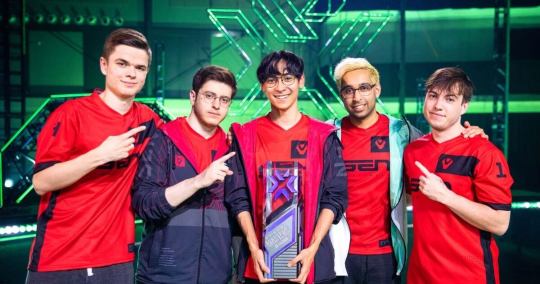
Masters Tournament will lead to the VCT finale "Valorant Champions"
First "Valorant Champions" winner, Acend.

Valorant Champions Tournament 2022 changed the format of their schedule and will have the "Valorant Champions" held earlier rather than to be held at the end of the year. This will follow through until 2024

PREMIER
Premier will be a game mode inside Valorant that will have you play with your team with same ranks and each week there will be a match against teams that have the same rank and skill level as you. This game mode will let casual players try to play at the highest level and will have a chance to get their team to a official Valorant Tournament. Open Beta launched at April 25, 2023 and the official was released at August 29, 2023.
youtube
Valorant Champions Tour 2025
Valorant once again changed the format for Challengers, Game Changers, VCT and changed their schedule. The new schedule looks like they want to have more events and try to fit all tournaments for the whole year and to shorten the off season. Valorant also released the location for next year tournament.
Masters Bangkok
Masters Toronto
Champions Paris

10 notes
·
View notes
Text
Can a video game teach you to resist disinformation?
The U.S. government certainly thinks so: In May, the State Department’s Global Engagement Center (GEC), the government agency tasked with countering foreign disinformation, released a request for proposal offering $1 million for “an evergreen game in a sandbox platform, with an existing fan base, in which participants play a game that builds cognitive resilience to authoritarianism and promotes democratic norms and values.” The call for a sandbox platform refers to open, multiplayer game spaces such as Minecraft, Roblox, or Fortnite, which allow players to build forts, explore virtual worlds, experience short stories, and share experiences. This request is asking for proposals to use creative mode in Fortnite (or a similar platform) to design a custom game experience—only instead of being fun, it is meant to train people to resist Russian disinformation.
It’s an intriguing way to combat an existential challenge for democracy. Can play undermine lies more effectively than speech does? There is a lot about this idea that is compelling, but there are just as many reasons to be skeptical.
The GEC’s idea certainly has some validity. It wants to leverage the emerging field of prebunking—the art of making people aware of disinformation before they encounter it—to help build media literacy skills and contribute to online safety. This is a process that researchers call “inoculation,” which treats disinformation like a virus: You need to train your psychological immune system, so to speak, to learn how to identify and reject bad information. Researchers have suggested different methods for this, ranging from a very literal metaphor of exposing people to “weakened” forms of common disinformation up to complex media literacy training intended to prepare people to identify disinformation on their own.
Using games as part of the battle over information isn’t new. The United Nations Office of Counter-Terrorism has an entire project devoted to understanding the role of video games in what the U.N. calls “countering violent extremism.” Late last year, the Swedish Psychological Defense Agency—which, like the GEC, is empowered to combat foreign disinformation—sponsored research into foreign political interference that uses video games. And the European Journalism Observatory has highlighted video games, specifically, as a vector for disinformation during Russia’s ongoing invasion of Ukraine.
So, the GEC is addressing a serious problem with global implications. And the sandbox anti-disinformation proposal is not the only video game program that the agency is funding. As Aftermath reports, it is also offering $250,000 for a program at the U.S. Embassy in Ukraine that will use the process of building an esports team and hosting an esports tournament to provide “counter disinformation/conflict resolution training to confront foreign propaganda and disinformation in competitive online gaming spaces.” While these sums may seem high, a typical “indie��� game (one that is not developed by a major studio) can cost a million dollars or more, and so-called AAA games (such as Grand Theft Auto, Fallout, or Call of Duty) can cost hundreds of millions of dollars to develop.
One challenge that inoculation programs face is establishing success conditions. After all, how do you know when someone is successfully protected against disinformation? There is no good answer for this yet—we can design experiments and surveys to measure how messages are being accepted or rejected by a population, but—like other preventative measures—success is negative. You know the program worked if you don’t see people repeating disinformation, rather than knowing it worked because some tangible finish line has been crossed. It is a problem requiring constant vigilance. In that sense, the GEC’s call for an evergreen (permanent) game to counter disinformation is aligned with broad aspects of disinformation research.
But is a game the best way to do this? For decades, games studies have adopted an argument put forth by Dutch cultural historian Johan Huizinga in the 1930s: Games and play are essential to civilization, because they (however unintentionally) teach children how to socialize and move within rules-based systems in a mirror of society.
Building on those ideas, media theorist Ian Bogost coined the term “procedural rhetoric” in the 2000s to argue that video games instruct players to view the world through a certain set of rules and to discard others—even when trying to “break” a game system, he argued, players are still learning how rules and games work. If one accepts this line of argument, then it would naturally follow that an effort to design a game to inoculate against disinformation has the potential to be highly effective.
There are some problems with this approach. The research into so-called serious games, which are games intended to do something other than entertain, suggests that they are the most effective when they are also fun to play. This is a bit of a contradiction, since a serious game is not made with entertainment as its primary purpose, and that is reflected in the GEC’s call. There is no mention of the evergreen game being fun for its players. The agency, understandably, is focused on the outcomes of the game, not the game itself. But making serious games fun is a hard challenge that researchers are still working on, and without it, the effectiveness of any serious game will be limited.
The fun challenge has plagued efforts to use video games to do achieve goals in foreign policy, statecraft, and human rights since the start of the 21st century. Games such as the International Committee of the Red Cross’s LifeRun (2020) or 11 Bit Studio’s This War of Mine (2011) try to cultivate in players a concern for civilians in warfare. The Lebanese militant group Hezbollah released Special Force (2003) so players can battle against Israeli soldiers in South Lebanon, and Fursan Al-Aqsa (2022), places players in the shoes of a Palestinian student who seeks revenge on the Israeli soldiers who tortured him in prison. Fursan is available on Steam, an online video game marketplace used by players around the world that (relevant for the GEC grants) also restricts sales in Russia and Belarus due to sanctions stemming from Russia’s 2022 invasion of Ukraine.
Militaries have used games for propaganda, too, from America’s Army (2002) to China’s Glorious Mission (2011). Some of these games went nowhere. (Hezbollah, for instance, did not make a fun game.) But others, such as America’s Army, endured for decades because they were fun—and that game became fun by abandoning some of its more serious pretensions as new editions were published.
While it is clear that the GEC is drawing on a large number of precedents, ideas, and projects, is there evidence that any of it works? After studying the Red Cross’s LifeRun game, which seems to be a close analog to the GEC’s call for proposals, scholar Jolene Fisher concluded that there are structural limits to what these games can be expected to do, given their small distribution and limited scale. In a recent report, the Carnegie Endowment for International Peace observed that initiatives to support local journalism and media literacy education were far more effective at undermining disinformation than statecraft or counter-messaging, but the former are also much more difficult to fund, implement, and scale.
Bogost, the media scholar, reflected in 2018 on his experience trying to make “persuasive games” and concluded the concept was more promise than delivery. “It was emotion and novelty that drove much of the interest in this work,” he wrote, not concrete or supportable projects. It could be that games are just an accessible channel to do this work compared to more effective methods.
There are broader issues with the GEC’s plans, too. I wrote my Ph.D. dissertation on the U.S. Army Esports (USAE) team, an effort launched in 2018 in an attempt to use esports to bolster years of flagging recruitment. The U.S. Defense Department certainly seems to be convinced that the team has been effective in growing its recruiting pipeline and boosting morale, however controversial it may be. But it also does not release data to support its claims of effectiveness, and in 2023, the Army announced a major overhaul of the recruiting process due to multiple consecutive years of missing enlistment goals. If the USAE is effective at growing recruitment, that growth was hard to see. (The service claims that it is on track to meet a much lower recruiting goal in 2024).
I wasn’t alone in observing the limited effects that games on influencing thinking. A couple of years ago, games scholar Philip Hammond observed that decades of U.S. military influence on video games has coincided with declining recruiting and less public trust. If games can persuade people, it’s hard to see how.
This does not mean that such programs are a failure, nor does it mean that the GEC’s program is futile. Rather, it indicates that, as Bogost cautioned, we should be clear about the gap between promise and delivery, and mindful of where that gap emerges.
The GEC’s success in persuading social media companies to moderate away Islamist extremist content on their platforms (the most effective way to counter disinformation, according to researchers) suggests that it sometimes can do this work effectively. After all, while the growing presence of extremists in video games is a real concern, it is the community and discourse around games where that extremism tends to emerge, not within the storylines and play of the games themselves.
Games scholar Sky LaRell Anderson calls these conversations “extraludic narratives,” and in studying them found that they form an important basis for building communities around sharing gameplay experiences. Such a dynamic leaves open the potential for the GEC’s sponsored esports team in Ukraine to influence some of those narratives about Russia, or even to cultivate a community of resistance against Russian narratives in Ukraine’s Esports spaces. But researchers find this dynamic hard for outsiders to understand in real time, much less to intentionally shape beforehand. Governments just aren’t cool, and the USAE’s own engagement scandals point to the many scenarios where government sponsorship might be a poison pill.
The GEC has experienced this with its other efforts to counter disinformation. Its successful campaign to contain Islamist disinformation online, when applied to countering Russian disinformation, resulted in the center being subjected to unfair, partisan attacks by far-right politicians in the United States. Republicans in the House of Representatives tried last year to block the center’s budgetary reauthorization, falsely claiming that it targeted conservatives for censorship. Embattled Rep. Darrell Issa disputed the need for a counter-disinformation agency and claimed that the GEC had no successes to justify its budget despite the agency’s successful work countering disinformation.
The dishonest nature of these attacks points to a difficult political environment emerging for the agency. It could be the case that sponsoring games and gaming events is all that the agency has left if platform governance has become closed off by toxic right-wing politics. The GEC is a meaningful organization that treats the threat of disinformation with the appropriate seriousness.
But if politics prevent the agency from responding effectively to disinformation in the venues where it can be the most effective, it is hard to blame it for trying something else. Still, we should be cautious and keep our expectations in check: As unfair as the right-wing attacks on the agency are, and as hard as it works to address disinformation globally, those same attacks will also be carried over to the teams and games the agency sponsors.
Even in an ideal environment, there would be modest expectations for such a small program, but those may be impossible to meet. Disinformation is ultimately a political challenge, not a technical one, and the politics of disinformation in the United States have already tied the GEC’s hands. It’s just not clear how this political problem can be solved with a video game.
10 notes
·
View notes
Text
Ranting
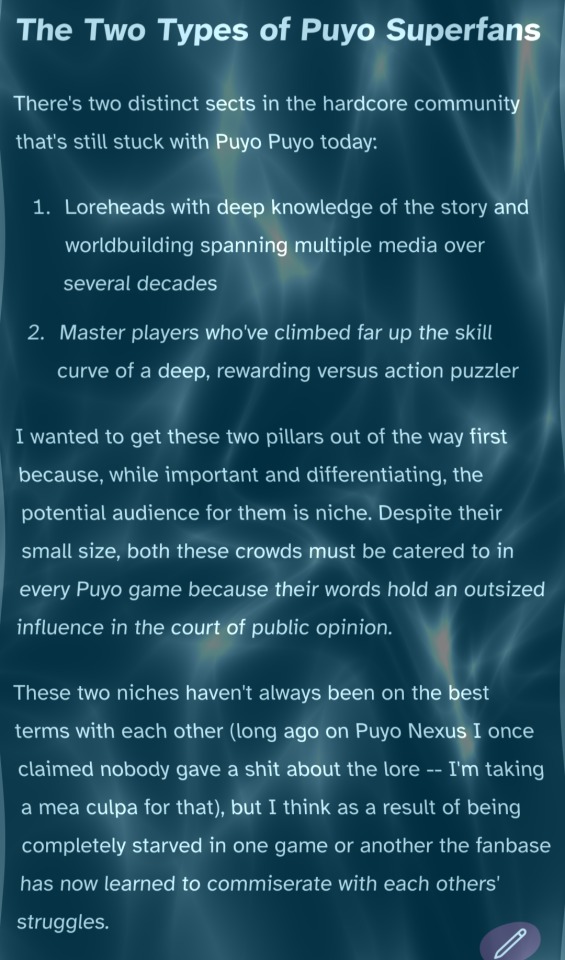
This post is kind of annoying to me because I have always hated the divide of "lore/character fan" vs "gameplay fan" as someone who doesn't identify strictly with either category. I love playing Puyo Puyo and I love the characters and the world of it. I do not think I slot into either box easily.
I also just kind of don't really like how this person says the sub communities don't get along when I feel like that is mostly because a lot of competitive players in the eng speaking community act like they're too good to care about the characters... This sentiment is not as prominent as before, true, but I still see echoes of it now and then and I actually think it just further alienates the casual audience of the game from interacting with the community and its competitive aspect.
There is a lot to like about the competitive community, but I've met so many people who feel embarrassed about their skills because of how people talked down to them about it. And like. I'll be honest guys: let people suck at the game. I'm never going to be a high level player and I'm just barely scraping by as an intermediate player and that's actually fine.
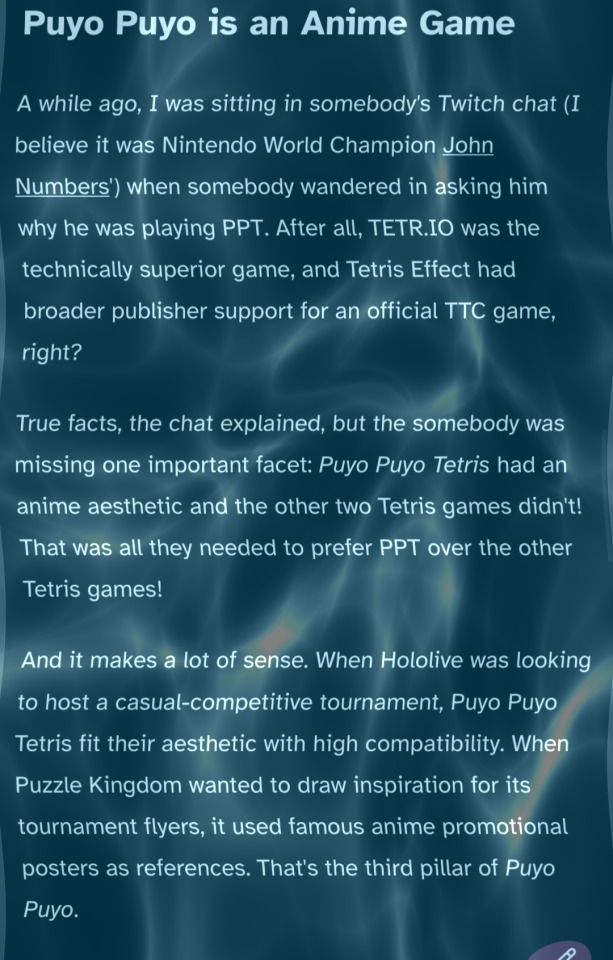
This point also doesn't make sense to me. I thought this was obvious.
Ever since it was Madou Monogatari, Puyo Puyo has always featured the characters as a selling point. that anime aesthetic maybe wasn't prominent in Japan because it's normalized there (it's just cartoons...) but I don't think people played the original Puyo Puyo because it was a competitive game, I think they played it because of the characters.
Additionally the interesting visuals (spells, characters, chain animations, general UI stuff) of Puyo Puyo are appealing to people that don't know the game (and it's also highly satisfying)
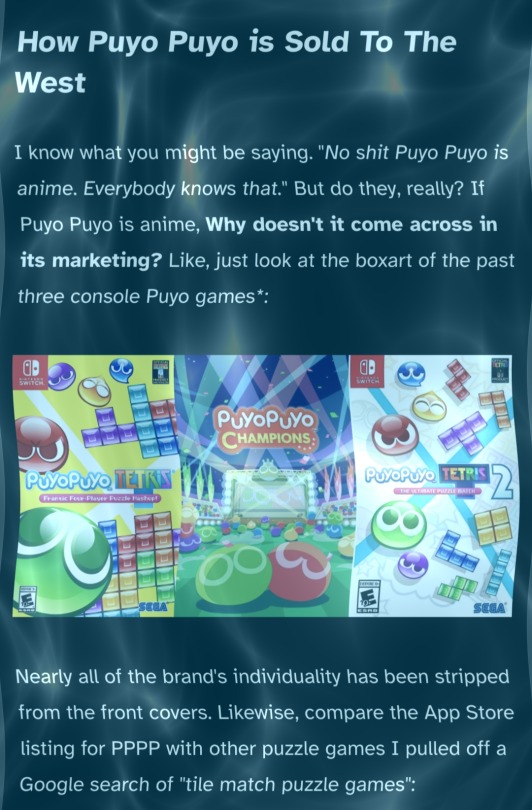
This point doesn't make sense to me either because Japanese and American boxarts are not very different for Puyo Puyo.
It is not a fault of how it is marketed to..."the west". but a larger issue here of how it is marketed with a focus on its brand than what makes it unique from other puzzlers. The last Puyo Puyo game to feature characters on its boxarts was Puyo Puyo Fever 2 anyway.
I concede that this person brought up Moo Niitani emphasizing the characters more than the actual gameplay when Puyo Puyo was still owned by compile and that Sega just lost sight of that along the way, but I don't think this should be surprising.
The characters of Puyo Puyo have always been part of its draw (and that sometimes means the lore is important)
Additionally: the people who will be going out and buying new Puyo games are going to be mostly casual players who like the characters or have some nostalgia for the series.
If the competitive community can stick with Champions/eSports until the end of time, there is genuinely no reason for them to be buying new games every time it comes out. There's no innovation on the main competitive game mode (Puyo Puyo Tsu) outside of minor tweaks and adjustments between games as far as I am aware.
But the people who like the characters/stories or want to play it with friends etc are going to be most of the people going out to buy the game...and that's what speaks to Sega. I don't really know why people think targeting the competitive community would be better. In fact, in a perfect world, a game would have a lot of single player and local multiplayer content for an average casual player but also good online, tournament support, and more customizable features for the competitive players. We don't live in this world right now, but I really don't know what point OPs post was trying to make in the first place? A lot of this is stuff you realize if you actually engage with "both sides" of the community and don't stick to a small bubble
9 notes
·
View notes
Text
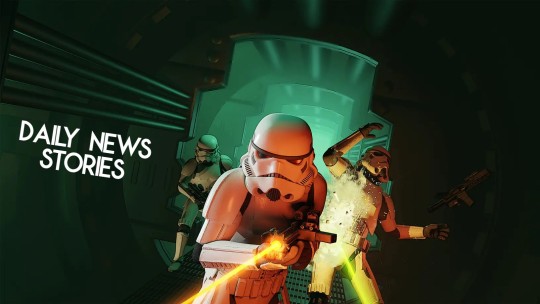
Video Game News Stories for February 26th, 2024
Legal Battles Rock the Industry:
Call of Duty Lawsuit Challenges Esports Dominance: A group of gamers sent shockwaves through the esports community by filing a lawsuit against Activision Blizzard, Inc., accusing the company of monopolizing control over Call of Duty esports leagues and tournaments. This legal action could have far-reaching consequences, potentially forcing Activision to adjust its esports strategy and pave the way for a more competitive environment.
Platform Shifts and Strategic Moves:
Microsoft Embraces Multiplatform Strategy: In a surprising turn of events, Microsoft Corporation announced plans to release four upcoming Xbox titles on external platforms, including PC and potentially even rival consoles like Sony's PlayStation. This move signifies a significant departure from the company's longstanding strategy of platform exclusivity, a cornerstone of the "console wars." The new approach could lead to wider accessibility for Xbox games, potentially attracting new demographics and impacting development strategies across platforms in the face of increased competition.
Sony Adjusts PS5 Sales Target, Prepares for IPO: Sony Interactive Entertainment Inc. adjusted its PlayStation 5 sales target downwards, citing ongoing supply chain disruptions and economic uncertainties. This news comes alongside reports that the company is planning an initial public offering (IPO) for its financial unit in 2025. The revised sales target suggests potential adjustments to Sony's production and distribution strategies in the coming months, while the planned IPO could be a strategic move to raise capital for future endeavors.
Beyond the Headlines:
Nintendo Switch 2 Rumors Gain Momentum: Speculation surrounding the potential launch of a successor to the hugely successful Nintendo Switch console later this year continues to gather steam. Fans eagerly await official announcements from Nintendo regarding the next iteration of the popular platform, with potential implications for the continued success of the Switch franchise and the broader handheld gaming market.
Elden Ring Mobile Version: Speculation Ignites Fan Interest: Rumors of a mobile version of the critically acclaimed game Elden Ring are circulating online, sparking excitement among fans who desire to experience the title on the go. While unconfirmed, the prospect has captivated the gaming community, leading to discussions about the feasibility of adapting the game's complex mechanics to mobile platforms and the potential impact on mobile gaming trends.
"Princess Peach: Showtime" Generates Positive Buzz: The recent Nintendo Direct Partner Showcase unveiled "Princess Peach: Showtime," a new title receiving positive first impressions for its innovative gameplay and engaging story. This upcoming release has garnered significant interest within the gaming community, particularly among fans of the Super Mario franchise, potentially influencing player expectations and pre-order trends.
This Week's Video Game Releases (February 26 - March 2, 2024):
February 28, 2024:
Brothers: A Tale of Two Sons Remake (PlayStation 5, Xbox Series X/S, PC)
Cook, Serve, Delicious! (Xbox Series X/S, Xbox One)
Star Wars: Dark Forces Remaster (PlayStation 5, Xbox Series X/S, PlayStation 4, Xbox One, Switch, PC)
Additional News Stories:
Call of Duty Servers Crash, Player Stats Reset: Adding to the woes of Call of Duty players, server outages caused frustration and confusion due to data resets.
PlayStation VR 2 Expands Horizons with PC Support: In a move that may delight PC VR enthusiasts, Sony announced that PlayStation VR 2 will support PC games sometime in 2024, potentially expanding its player base.
Fortnite Emote Faces Lawsuit: A choreographer filed a lawsuit against Epic Games, claiming their copyrighted dance moves were used in a Fortnite emote without proper permission, raising discussions about intellectual property rights and fair use within the gaming industry.
#video games#gaming#gaming news#fortnite#call of duty#star wars#star wars dark forces#playstation#sony#xbox#microsoft#nintendo#princess peach#princess peach showtime#nintendo switch#news
12 notes
·
View notes
Text
Are gaming communities becoming less about play and more about monetisation?
In an age where entertainment and technology are developing at a neck-breaking pace, gaming communities have seen a metamorphosis that goes beyond conventional play. What was once a large leisure activity has developed into a vibrant hub of entertainment and business, posing fascinating queries about how these digital communities are changing. The entire foundation of gaming communities finds itself at a crossroads as the industry observes the integration of monetization tactics, from in-game purchases to the thriving sphere of esports and content production. In exploring the changing dynamics, we dive further into the topic of whether these communities are becoming less about the pure joy of play and more about the complex web of commercialization that now permeates virtual worlds.
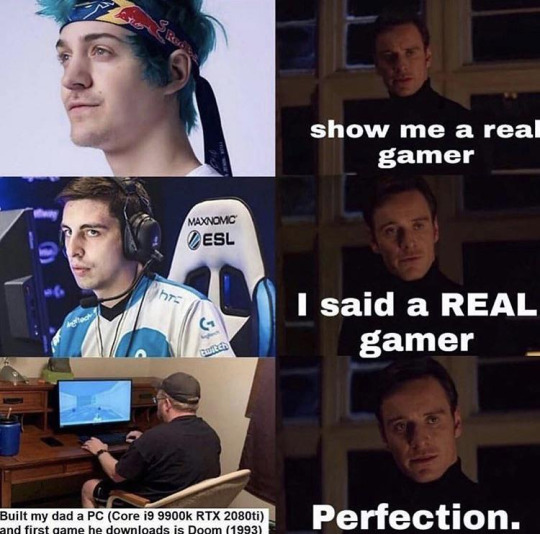
These days, microtransactions and on-game purchases are common in contemporary games, enabling users to purchase in-game cosmetics, virtual goods, or other upgrades. Both platform providers and game creators will benefit from these transactions. Older generations can now afford more expensive games on different digital distribution platforms and can afford to pay for in-game microtransactions or to support their favourite streamer or online celebrity, playing video games has become an increasingly important social activity for young people (Bankov 2019). Through the streamer, gamers would be more likely to purchase the in-game item due to how good it looks on the streamer’s interface so they get an idea of how it works. As an example, in a simple mobile game like, ‘Subway Surfers’, most of the characters require the user to spend the in-game currency to buy the characters. Most of the time people would not be pros at the game and would end up buying the in-game currency to buy the character. Even though it is a free game, players would spend extra money to purchase the extra things in the game.
There is a heated argument about how these trades affect what play is really about. While some contend that these transactions provide gamers a way to customize and enhance their gaming experience, others are worried that they might lead to an unfair playing field where those with larger wallets have a clear edge. The problem of commercialization in AAA games is one that both consumers and developers must consider equally as regardless of how well a game is designed, the financial influence that players believe they may have on creators supports the continued use of monetization strategies (Ahmadu 2023).
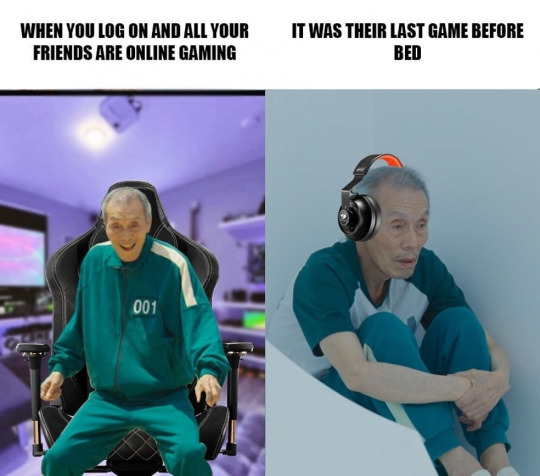
The growth of esports is another aspect of the trend toward commercialization. What started out as amicable buddy competitions has grown into a multibillion-dollar business. Esports competitions draw enormous viewership, and their financial appeal is bolstered by lucrative sponsorship and advertising partnerships. One topic that comes up is whether the competitive scene or gaming communities are more important to the spirit of play, or if money is the primary motivator. According to (Rauth 2023), esports are now so popular that they compete with regular sports for price money and viewership that professional gamers can compete in competitions for millions of dollars, or they can broadcast content on websites like Twitch. Similar to conventional professional sports, esports teams are valued at a total of $1 billion because of their owners, franchises, endorsement deals, cash rewards from tournament wins, and other factors (Shalabi, 2023).

For gaming communities, the emergence of game streaming websites like Twitch and YouTube has opened up new horizons. These days, gamers may create their content by sharing their gameplay experiences with hundreds, perhaps millions, of viewers. This phenomenon has elevated gaming to a new level of popularity among internet users, but it also begs the question of how monetization affects the process of creating original content. A major factor in opening up Esports to a worldwide audience has been the emergence of internet streaming services like Twitch and YouTube gaming (Sponsored Post, 2023). Most gamers earn a large sum of cash from competing in esports competitions while others would livestream their pro-gaming on media sites such as Twitch and YouTube.
It’s important to understand that there is a positive link between play and monetization even as gaming communities struggle with these changes. Many contend that revenue generation gives game creators the means to produce and support top-notch games. The money made may go towards further content development, enhancements, and upgrades, which will enhance their entire game experience. Finding the ideal mix is crucial. People run a risk of offending the same people who helped to make the game popular in the first place when you tilt the balance too much in favour of commercialization. It is a challenge for developers and the gaming community to carefully traverse this terrain while maintaining the primary focus of the enjoyment of play.
List of references
Admadu, J 2023, ‘Consumer perspectives towards monetization and its impact on AAA game designs’, Master Thesis in Game Design, Uppsala University, Sweden, <https://uu.diva-portal.org/smash/get/diva2:1769625/FULLTEXT01.pdf>.
Bankov, B 2019, ‘The impact of social media on video game communities and the gaming industry’, Information and Communication Technologies in Business and Education, viewed 13 November 2023, <https://www.pewresearch.org/internet/2018/07/03/the-positives-of-digital-life/>.
Rauth, R 2023, ‘The rising popularity of competitive esports’, Job Skills, 21 February, viewed 15 November 2023, <https://www.jobskills.org/the-rising-popularity-of-competitive-esports/>.
Shalabi, C 2023, ‘Esports: what is it and how it benefits marketers’, Insider Intelligence, 11 October, viewed 15 November 2023, <https://www.insiderintelligence.com/insights/esports-ecosystem-market-report/>.Sponsored Post 2023, ‘The rise of esports: a digital revolution in competitive gaming’, Channel Television, 28 July, viewed 15 November 2023, <https://www.channelstv.com/2023/07/28/the-rise-of-esports-a-digital-revolution-in-competitive-gaming/#:~:text=The%20rise%20of%20online%20streaming,analysis%2C%20enhancing%20the%20spectator%20experience.>.
7 notes
·
View notes
Text
nut introduces himself as a ragnarok online esports player in interviews as late as 2021. he talked a bit about this tournament in boys journey ep 1 as well! here's him in 2017 (his team won)
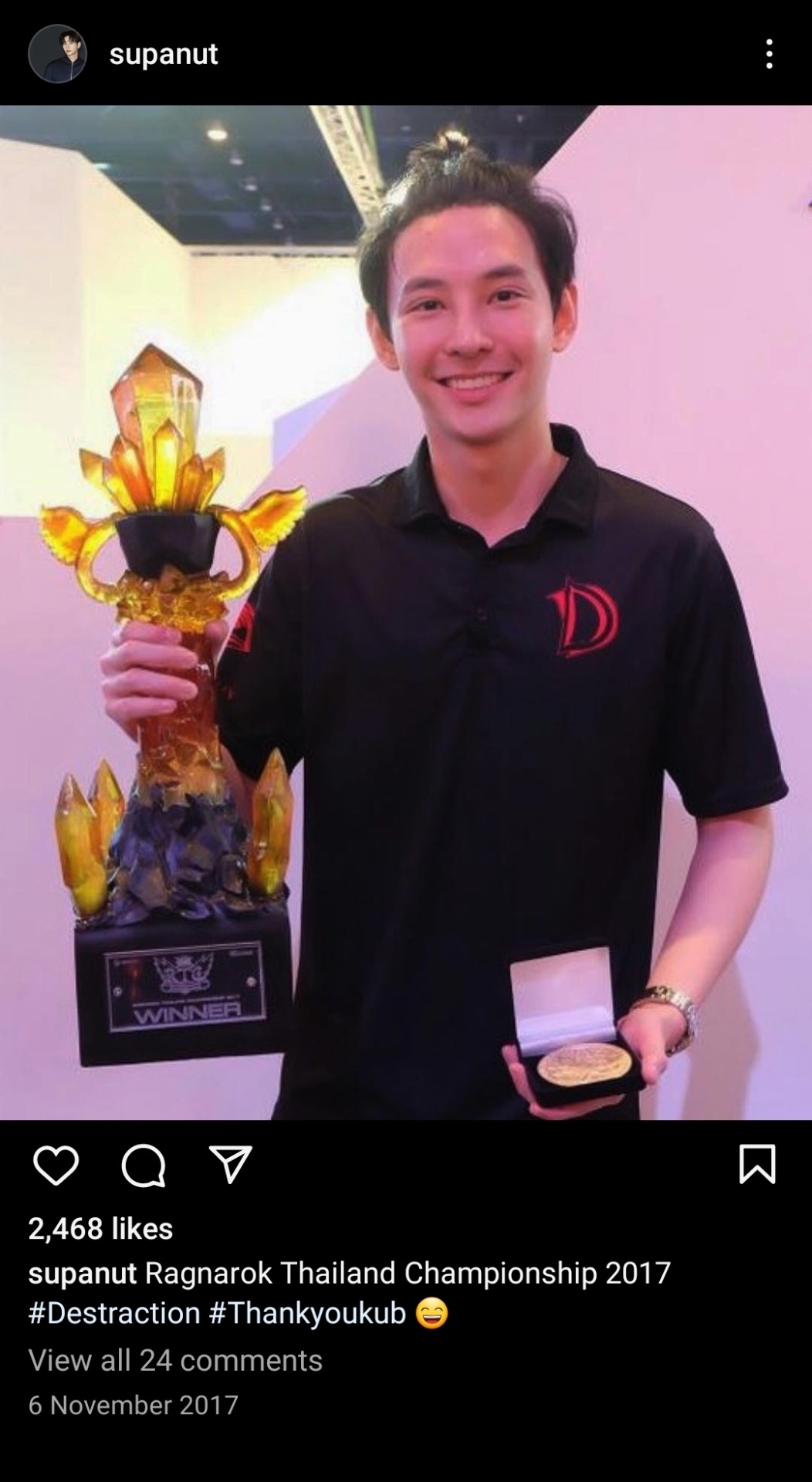
he also mentions skipping classes in university to game in a nutplan video (i do not have the link on hand) 😭😭 he doesnt game as much now but he did stream on tiktok in january, i think with topten? hoping to see more of gamer supanut someday
4 notes
·
View notes
Text
Join the String Esports Tournament and Turn Your Passion into Rewarding Victories

Register now for String Esports Valorant Tournament Website and Discord Link in Bio 🆓FREE ENTRY 🎮Platform: PS5 & Xbox SX 📖Format: 5v5 Competitive - Best of 3 📍Region: Asia ⏰Tournament Start Date: 7th Sept 6pm IST Register here: http://esports.stringmetaverse.com/
0 notes
Text
Unraveling the Excitement of Mobile Legends: Bang Bang
Greetings from the high-stress world of Mobile Legends: Bang Bang! We'll look at the community, strategy, and immersive gameplay experience that made Mobile Legends such a hit among mobile gamers in this blog post.
Understanding the Game
Discover the basics of Mobile Legends: Bang Bang. From its multiplayer online battle arena (MOBA) format to the diverse array of heroes and their unique abilities, this section provides an overview of the game's mechanics and how it captivates millions of players worldwide.
Mastering Heroes and Strategies
Delve deeper into the game by exploring various heroes and their roles within the battlefield. From tanks to marksmen, unravel the strengths, weaknesses, and optimal strategies for each hero. Learn about team composition, laning strategies, and the importance of teamwork for victory.
Competitive Scene and Esports
Explore the competitive side of Mobile Legends. Learn about the esports tournaments, competitive leagues, and the thrilling matchups among professional players. Dive into the evolving meta, strategies, and the ever-changing landscape of Mobile Legends esports.
Community and Engagement
Discover the vibrant community that surrounds Mobile Legends. From forums to fan art, cosplay, and content creation, witness the passion and dedication of players worldwide. Explore the impact of player feedback, updates, and events that keep the community engaged.
Tips and Tricks for New Players
For newcomers to Mobile Legends, here are some valuable tips and tricks to get started on the right foot. From optimizing gameplay settings to honing your skills and understanding the in-game economy, these insights will help you embark on your Mobile Legends journey.
As we conclude this exploration of Mobile Legends: Bang Bang, we hope this blog post has shed light on the immersive gaming experience, strategic depth, and vibrant community that continue to fuel the game's popularity. Whether you're a seasoned player or just stepping into the battlefield, Mobile Legends offers an exhilarating gaming journey that brings together players from all corners of the globe.
2 notes
·
View notes
Text
The Current State of Blizzard Properties as of 7-24-2023
Diablo: Lore/Story getting progressively worse/bad from one game to the next including Diablo Immortal and Diablo 4
Diablo 2 Resurrected: A game for the most hardcore Diablo 2 fans with updated graphics or you can turn them off to experience the hirez pixels
StarCraft 2: Lore/Story progressively worse/bad, put on maintenance mode, competitive cancelled although its a free game now/has been awhile which started with the custom game arcade then the whole thing did. Heck, Legacy of the Void didn’t have a cinematic when you first opened it originally when it came out.
StarCraft Remastered: Experience StarCraft with updated graphics
World of Warcraft: Lore/Story progressively getting worse/bad by each expansion and retcon
Classic World of Warcraft: Just like Old School RuneScape, with the queues for items and everything
Warcraft 3 Reforged: A game to delete all the copyright infringement that people we committing in custom games, ruins the reasons why people were playing it.
Overwatch 1: Deleted, why did I pay $60 for that?
Overwatch 2: Lore/Story cancelled, competitive now cancelled as of today with all the esports staff being laid off
Edit: Overwatch 2: The lore/story is still on through how Overwatch 1 was. Comics, cinematics, anything available outside the game. Additional modes to be added for $15
Heroes of the Storm: Cancelled/put on maintenance mode
Hearthstone: Essentially bloated pay to win aspects, esports tournaments and staff have been significantly reduced
And thats it. That’s what’s going on with all these properties from this small indie company. Which is the narrative anyone wants to say whenever there is any kind of criticism leveled against them. I have been a long time Blizzard fan so you can say I am part of the problem in supporting them. To me Blizzard is nostalgic but I never had a real chance to get into WoW because we lived on a farm with dial up until 2010. So if I wanted to do anything online I had to go to college or a cafe to play games. I don’t know how to feel about it in 2023.
#blizzard#blizzard entertainment#news#thoughts#hot takes#small indie company#cancelled#competitive analysis#competitive cancelled#Overwatch#wow#StarCraft#Overwatch 2#hearthstone#heroes of the storm#diablo series#nostalgia
4 notes
·
View notes
Text
Today, July 20, 2023, we are celebrating our 99th birthday!

Many of you across the world will celebrate International Chess Day 2023 with various activities and happenings all about our beloved game. On this day, we want to reinforce the tradition started in previous years: we ask members of the chess community to teach someone how to play chess. The more, the merrier! Be it your neighbour, niece, colleague or grandfather, let's make the chess family grow. Don't forget to share your experience on social media using the hashtag #Internationalchessday. Let's make our celebrations really big and prove that chess is the most played game in the world!
Why did the United Nations choose exactly July 20 to celebrate chess? It was done to mark the date of the International Chess Federation's establishment in 1924, so it is also our birthday! Let's briefly walk through our history and remember all the major milestones that lead us to this day.
International Chess Federation, or shorter, FIDE (stands for Fédération Internationale des Échecs), is the governing body for the game of chess. What does FIDE do? It organizes major chess events, which form the World Championship Cycle, Chess Olympiads, Rapid and Blitz Championships, tournaments for people with disabilities, veterans, and children, as well as various exhibition and online events. It awards international chess titles, like the coveted Grandmaster, and calculates rating. FIDE creates and implements the rules of chess and standards for tournaments. It is actively involved in social projects and the promotion of chess on the grassroots level. FIDE is recognized by International Olympic Committee and includes as many as 199 national chess federations! Let's have a closer look.
FIDE was formed on July 20, 1924, in Paris, France, during the first unofficial Chess Olympiad. It was born at the Town Hall of the IX Arrondissement of Paris (6 Rue Drouot). Fifteen delegates from all over the world signed the proclamation act, and our organization was born.
In 1927, FIDE organized the first Chess Olympiad and the first Women's World Championship in London. In 1948, FIDE started overseeing the World Chess Championship. Today, both absolute and women's chess crowns belong to players from China: Ding Liren and Ju Wenjun.
In 1950, FIDE awarded its first Grandmaster title to 27 players. Today, FIDE titles also include International Master, Women's Grandmaster, Women's International Master, and lower-level ones like FIDE Master or FIDE Candidates Master.
The first official FIDE rating list came out in 1971. This universal rating system, named after its creator Arpad Elo measures a player's skill level and tracks their progress over time. New rating lists are out at the beginning of every month, and professionals and amateurs alike are eager to check the new numbers next to their surname.
In 1999, FIDE was recognized by the International Olympic Committee – a major milestone in the organization's history.
The motto of FIDE is "Gens una sumus", which translates from Latin as "We are one family". This motto is a reflection of the organization's vision of chess as a sport that unites people from all over the world. Family means care, and in recent years FIDE's social projects have become an essential part of the organization's operations. "Infinite Chess" project introduces the game to children with ASD, "Chess for Freedom" program brings chess behind the bars of prisons, "Chess for Protection" helps refugees find their way with the help of the game. FIDE financially supports its veterans in need and holds competitions for people with disabilities. The first Chess Olympiad for People with Disabilities took place in January-February 2023 in Belgrade.
Chess has found its place in the ever-changing world of modern technology. Today, FIDE organizes online and hybrid events and implements new technological solutions. In 2023 chess became part of the Olympic Esports Series.
Next year, FIDE will celebrate its 100-year birthday. The International Chess Federation has come a long way since its first steps a century ago. Today, it is based in Switzerland alongside other major sports governing bodies. It encompasses 199 national chess federations, which makes FIDE one of the largest sports federations in the world.
Throughout its history, FIDE has been instrumental in shaping the world of chess, and we never stop aiming for new heights, serving the game and chess community.
3 notes
·
View notes
Note
hey! Just watched Players, and was interested in hearing more of your thoughts on it--in what respects you found it hewed true to your own research/experience. I've never engaged with eSports, but Players' depiction of "online masculinity" more broadly was very compelling to me, and reminded me of Jay from CQ, albeit with a more balanced/positive slant. I think that sincerity/positivity hurt the show by preventing it from exploring racism/sexism in gaming culture; you catch glimmers of it, particularly in the internet's reaction to Nightfall's replacement of Guru, but the show goes out of its way to avoid couching it in those terms, presumably to show eSports in a more sympathetic light. Race and gender are common themes in your stories; do you think you would have placed more of a focus on them? Also, have you seen American Vandal? That show's first season was memorable to me for its dissonant ending, which placed all that preceded in a new light; Players has a more understated version of the same, in which Organizm's inhuman, unhinged voicemail is shown to have perfectly predicted Creamcheese's feelings, thus humanizing it in retrospect--only for Organizm to reject this, sacrificing everything in pursuit of impossuble perfection. Many of the show's characters are embodiments of some skill/archetype, and it asks what exactly separates these paragons from ordinary people--which I felt closely matched your own style of characterisation. Thanks for your time!
I'll preface this by saying that I haven't actually seen Players. I just know about it, since it was heavily advertised on the LCS stream when it came out. I'll mention a fun fact though: Nightfall's actor is actually an ex-LCS pro named Youngbin, a Korean-American who once played for Team Liquid. As I understand it, the show also has cameos from many other real pros and esports personalities.
I can speak about some of the topics you brought up, though. First up, racism in the esports scene. This was one of the major topics I wanted to cover in my planned esports story. In particular, I wanted to use the story as a vehicle to challenge the idea of American exceptionalism. In League of Legends, the North American region is a distant fourth best, behind Korea, China, and Europe. In the early days of the scene it was possible to chalk this discrepancy up to infrastructure, especially when it came to Korea; having already developed a sophisticated esports scene due to StarCraft, Korea had an organizational and coaching edge over the rest of the world from about 2012, when the game first took off in Korea, to 2017, when big money investors in the other three regions were injecting huge cashflows into teams. This was an era of Korean dominance, where Korean teams won almost every time. To catch up, the other three regions would import Korean players to their regions as much as possible (since 2015 there have been rules in place to limit imports to 2 per 5-man team), and the only region to ever really catch up to Korea is China, which combined high-money importing of top Korean pros with the gargantuan Chinese server population (China loves League of Legends, it's like the national sport) to finally start winning some tournaments.
North America has consistently lagged behind even China and Europe, an issue mainly related to low server population and poor American internet infrastructure, which forces most prospective NA players to learn and practice the game on much higher ping than pros in any of the other major regions. On top of NA being bad, NA is consistently buoyed by high-profile import players, as opposed to "native" North American players. Actual American and Canadian players often take up filler role player positions around imported Korean and European stars, which has led to a general fact of life that Americans are simply not that good at the game compared to the competition. This is in spite of the fact that League of Legends is an American game made by an American company. It's a joke in traditional sports that Americans are only the best at sports they made, but in League, Americans aren't even that. I wanted to center my story around an American role player in a more supportive position like top, who would have to grapple with the fact that despite being in the top 1% of the top 1% of the top 1% of players, he was simply not good enough to matter beyond that.
Racism in the esports scene is an odd issue, because it's less "racism" and more "regionalism"--or xenophobia. This is due to the league format of professional League of Legends, in which regional leagues (Korea, China, Europe, and NA) feed into a major international Worlds cup. In a sports scene where teams are not tied to specific cities the way they are in traditional sports, this regionalism is often what drives fans to support certain teams, what causes people to root for a team that feels like "theirs." This makes the fan ecosystem closer to the way people root for teams or players at the Olympics or the World Cup, instead of what it's like in the NFL, NBA, etc. Where things get complicated in terms of League is that unlike the Olympics or World Cup, teams from a region are allowed to field players from other regions to represent them. In North America, as I mentioned, this issue is exacerbated because not only are North American teams bad, they're bad often without even being quote-unquote "North American." I mentioned before that there is an import rule that ostensibly ensures every team is 3/5ths comprised of native players. However, due to a variety of loopholes and also the United States' significantly more lenient legal residency and immigration restrictions compared to China, there are many players who were imported to NA solely to play League of Legends who are now technically counted as non-imports. At the most recent Worlds, NA sent three teams, and of the 15 players on those teams, only 3 were "native North Americans," the rest either being imports or former imports who got green cards, making them legally residents. One team was comprised entirely of imports or former imports. Meanwhile, other regions are represented by teams that have a majority of "native" players. So the fan ecosystem is designed around supporting "your region," but NA is in the unique position where "your region" is majority comprised of players from "another region." Hence the point of soreness.
The racism question gets further complicated by the racial makeup of "native" North American players, which heavily slants toward Asian-Americans/Asian-Canadians. Of the 3 "native" players at Worlds last year, 2 were Asian-American/-Canadian (the third was Quebecois). Doublelift, the most famous and beloved North American pro, on whom I believe Players' Creamcheese was modeled, is a Chinese-American whose real name is Yiliang Peng. The breakout rookie star of last year, Jojopyun, is a Korean-Canadian who "native NA" fans held up as the shining hope of native NA talent. Youngbin himself, who plays Nightfall, is a Korean-American "native" pro. This begs another interesting question: Is it racism to support Asian-Americans over Asian Non-Americans? I think this uniquely positioned sports ecosystem creates a complex and interlocking system of identities that is prime for exploration in a narrative format. With the prevalence of European importing, it becomes even stranger. Most of the white players in the North American league aren't Americans or Canadians, but European imports, who are often subjected to the same prejudice and bias among fans as Korean imports. THEN it gets even more interesting when you factor in country of birth, which isn't even tied to citizenship or residency. One of the most famous "native" North American players is Spica, who was born in China and moved to Philadelphia when he was 10 or so. He still has Chinese citizenship and is only considered a "resident" of the United States, exactly like many of those green card-holding "imports," and yet Spica is universally considered "native" talent by fans. Last year, one team (CLG) made a splash by fielding almost entirely "native" talent, and was held up by fans as the "native talent" team--even though one of their players, Dhokla, was born in India. So where is the line? What distinguishes "native" from "foreign"? This is such a complex notion of identity that I feel like I could talk about it for hours.
As for sexism, yeah it's just really sexist.
I guess it's a bit more nuanced than that. League of Legends is like chess in which there is ostensibly no physical reason why women wouldn't be able to compete at the top level, and yet there simply are very few women who do. I follow the League scene from the amateur system to the pro leagues, and it's not like there is a large number of talented female players who are simply being withheld chances to compete due to organizational/player/fan sexism. There have even been instances of major organizations creating all-female development teams, but these teams are generally comprised of players who simply aren't at a level high enough to compete in the major leagues. Every so often you get a female player or two in the amateur or development leagues, but they don't generally stand out enough to be realistically promoted to a major league team.
In all four major regions, there has only ever been one female player who competed at the top level, that being Remilia, a trans girl, whose story is brutally tragic. She was manipulated and abused by the owner of her team, Chris Badawi, who provided for her a botched gender-reassignment surgery that left her with permanent pain for the rest of her life, until she died by suicide some years later. As you might imagine, any fan discussion on Reddit that even tangentially involved Remilia was a graveyard of posts deleted by moderators. The prejudice there, sadly, is about as rampant and overt as possible.
This post went pretty long, especially since I haven't actually seen the show you asked about and wasn't able to give any more specific thoughts on it. Hopefully, though, this provides a bit more context to the strange and complex regional and racial identity issues in the scene.
9 notes
·
View notes
Text
The Development of Video Clip Games: From Pong to Virtual Fact
Video video games have come a lengthy method because the days of Pong. What began as simple, pixelated graphics on a tiny black and white screen has actually changed into immersive, practical experiences that transfer players to digital globes. The development of video games has been marked by advancements in innovation, graphics, gameplay auto mechanics, and storytelling, making it among one of the most prominent as well as prominent forms of home entertainment today.From the intro of house console systems like Nintendo's NES as well as Sega's Genesis to the rise of computer pc gaming and also the introduction of mobile video games, the sector has constantly pushed the borders of what is feasible. Graphics have actually become progressively natural, with video games like Red Dead Redemption 2 as well as The Last people Part II showcasing stunning aesthetic details that equal those located in blockbuster films. Gameplay technicians have actually also progressed, permitting facility and also dynamic interactions in between players and also their digital atmospheres. The introduction of on the internet multiplayer and also affordable video gaming has promoted vivid communities and also eSports tournaments, turning video games into a social as well as affordable phenomenon.

Paragraph 2: One more major milestone in the advancement of video clip games is the appearance of digital fact (VR) modern technology. With VR headsets like the Oculus Rift and PlayStation virtual reality, players can now fully immerse themselves in an online globe, experiencing video games in a whole brand-new means. VR has the possible to reinvent not only gaming however likewise various markets such as education, healthcare, and style. It enables for extraordinary degrees of interactivity as well as immersion, producing experiences that obscure the line in between the real and also the virtual.As technology remains to advance, the future of video games looks appealing. With the growth of cloud gaming systems like Google Stadia and Microsoft xCloud, players will be able to stream games without the demand for costly hardware, opening up video gaming to a wider audience. The combination of expert system as well as machine learning will result in more advanced and sensible video game worlds, boosting the general pc gaming experience. As video games remain to advance, one point is certain -they will certainly stay a cherished form of amusement, captivating players as well as pushing the limits of creativity and also advancement.
Read more here https://forcegame.pl/?p=174
3 notes
·
View notes